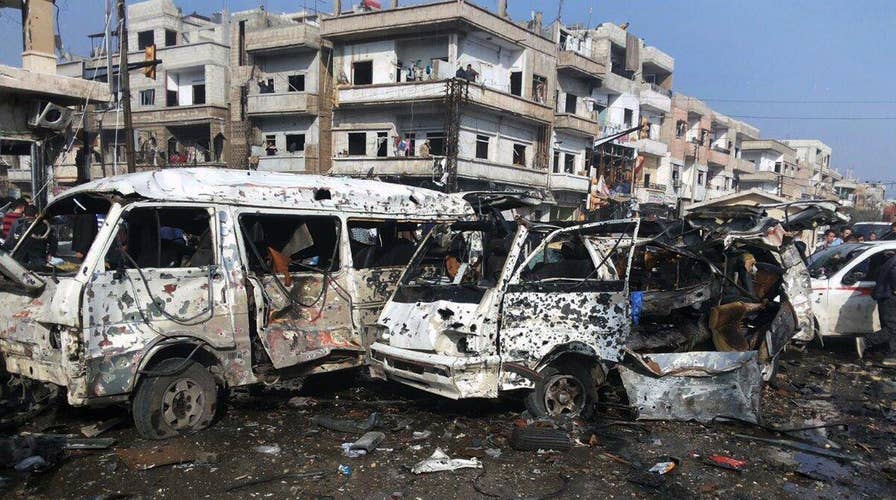Analyst on Syria truce: 'Destruction' of US foreign policy
Steamboat Institute fellow Tom Rogan says the repercussions will be felt globally
Syrian peace talks have resumed this week in Geneva. In Washington, the House of Representatives has unanimously approved a resolution declaring the Islamic State to have perpetrated genocide on Christians and other religious minorities in Syria and Iraq.
In Moscow, Vladimir Putin has announced the partial withdrawal of Russian combat forces from Syria. This is a time of promise for a region accustomed to despair.
Russia’s reduction of combat capabilities is particularly significant for the Geneva peace talks, giving Syrian President Bashar Assad encouragement to negotiate toward a transition regime, knowing Russian support will not be available in perpetuity (Putin avoiding America’s Vietnam and Russia’s Afghanistan debacles).
Participating in the Geneva talks, sponsored by the United Nations, are representatives of the Assad government and of the non-extremist elements of the anti-Assad opposition. These talks are intended not only concretize the cease-fire currently in place, but also to draft a new constitution and to implement national elections next year. In short, to create a new Syria.
No people have more at stake in the outcome of these peace talks than the one million Christians remaining in that country. Christians, along with other religious minorities, will be the most vulnerable to a bad outcome of the Geneva negotiations. Failure to put in place a pluralistic government of national unity with durable guarantees for the safety of religious minorities will mean a Syria from which Christians are simply eradicated – either killed or expelled.
And yet, Christians are unrepresented in the talks. There is no party to the negotiations which can speak on behalf of the interests of the Christians. Why? Because Christians are not belligerents in the civil war; they are neither government nor opposition. Christians are being excluded from the peace talks because they aren’t trying to kill anyone.
This is why we have delivered to the Secretary-General of the United Nations, Ban Ki-moon, a petition signed by 37,500 concerned citizens of many nations, bringing to the attention of United Nations officials the dangers faced by Syria's remaining Christians, and the need for their representation in Geneva.
The reason for the precariousness of the Christian situation in Syria is simple: there is no opposition group fighting the Assad regime which, if in power, would tolerate the presence of Christians and respect their rights to live in peace and practice their faith. Even the opposition groups backed by the United States have shown a reckless disregard for the safety and dignity of Christians. Just look at the photographs of the desolate Christian neighborhood of old Homs, gratuitously razed by the retreating Free Syrian Army two years ago. One bishop told us, “The difference between moderates and extremists is that extremists will kill you and take your house; the moderates will take your house, but let you live.”
Unfavorable outcomes of the peace talks from the Christian perspective include either a government dominated by unmoderated opposition forces intolerant of religious minorities, or a government too weak to defend itself from the extremist opposition forces of the al-Nusra Front and the Islamic State, neither of which are party to the talks. The extremists have been excluded from the current negotiations – but that does not mean they won’t continue to seek control of the nation.
Events in world have forced the great nations to seek with some urgency a resolution of the Syrian civil war. It began in March 2011; it has killed 250,000, driven 4.4 million out of the country, and made homeless another 6.6 million within Syria. The Christian population of Syria before the war was roughly two million, now half that number.
The richness of Syrian Christianity will make it difficult for Christians to be represented with one voice. The Christian Church in Syria is principally administered by the five Patriarchs of Antioch, successors of Saints Peter and Paul. These five patriarchs lead the Greek-Orthodox Church of Antioch, the Syriac Orthodox Church, the Melkite Greek Catholic Church, the Maronite Catholic Church, and the Syriac Catholic Church (the latter three are in communion with Rome). Other Christian churches with a significant presence in Syria are: the Chaldean Catholic Church, the Assyrian Church of the East, the Armenian Catholic Church, the Armenian Apostolic Church, and the Union of Armenian Evangelical Churches in the Near East.
But if Saudi Arabia was able to bring 100 opposition figures together in Riyadh late last year to agree on the structure of their representation at the talks, then the same can be accomplished by the disparate Christian communities. Diversity must not be an excuse to deny Christians their voice in designing tomorrow’s Syria.
Steve Wagner is president of Solidarity with the Persecuted Church a Washington, D.C.-based non-profit which provides assistance to the Christian Church where she faces persecution.

